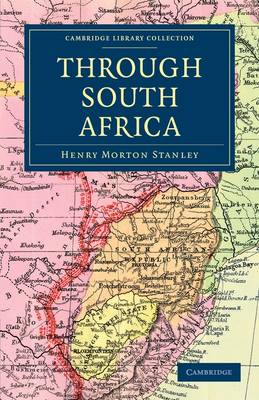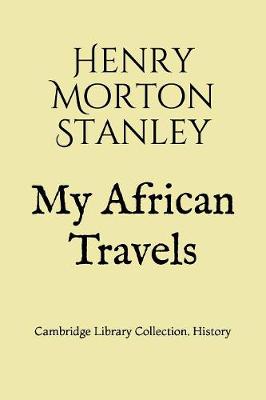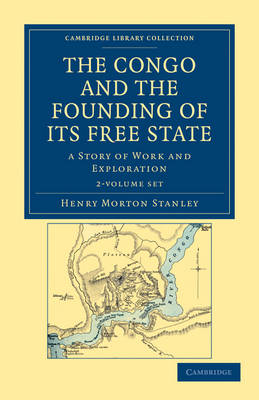Cambridge Library Collection - African Studies
2 primary works • 6 total works
Volume 1
The Congo and the Founding of its Free State: Volume 1
by Henry Morton Stanley
Published 25 August 2011
Sir Henry Morton Stanley (1841-1904) was a journalist and explorer renowned for his adventures in Africa. After emigrating to America in 1859, Stanley worked as a journalist for the New York Herald. In 1869 he was instructed to undertake an expedition to find the missionary David Livingstone, and the success of this mission brought him public recognition and financial success. These volumes, first published in 1885, provide an account of Stanley's exploration of the Congo river in the service of Leopold II of Belgium between 1879 and 1884. Deriving from Stanley's personal journal, the books describe the difficulties he faced as he founded permanent trading stations, and his negotiations with indigenous leaders, together with his plans for the commercial exploitation of Africa. Stanley's controversial methods to achieve this aim, which led to his modern reputation as a racist and imperialist, are also revealed. Volume 1 covers 1879-83.
Volume 2
The Congo and the Founding of its Free State: Volume 2
by Henry Morton Stanley
Published 25 August 2011
Sir Henry Morton Stanley (1841-1904) was a journalist and explorer renowned for his adventures in Africa. After emigrating to America in 1859, Stanley worked as a journalist for the New York Herald. In 1869 he was instructed to undertake an expedition to find the missionary David Livingstone, and the success of this mission brought him public recognition and financial success. These volumes, first published in 1885, provide an account of Stanley's exploration of the Congo river in the service of Leopold II of Belgium between 1879 and 1884. Deriving from Stanley's journal, the books describe the difficulties he faced as he founded permanent trading stations, and his negotiations with indigenous leaders, together with his plans for the commercial exploitation of Africa. Stanley's controversial methods to achieve this aim, which led to his modern reputation as a racist and imperialist, are also revealed. Volume 2 covers 1883-4.
Henry Morton Stanley (1841-1904), the Welsh-born explorer famous for his 1871 meeting with the missionary David Livingstone, travelled widely in Africa. First published in 1898, this is a compendium of letters written by Stanley during his travels to Bulawayo, Johannesburg and Pretoria, which lend a unique insight into colonial South Africa in the late nineteenth century. Focusing on the country's culture and commercial development, he recalls his impressions of industries such as railways, farms and gold mines, social issues such as immigration and poverty, and the contentious relations between the Boer peoples and the British colonists which led to the Second Boer War. Through his passionate exposition, we learn of his adversity towards President Kruger's policies, and his compassion for the people who he claims were left to starve because the government's priorities were military. His memoirs provide a revealing snapshot of an important period in South Africa's history.
Published in 1886, My African Travels is a succinct record of British American explorer Henry Morton Stanley's adventurous African expeditions during 1871-1884 and the results of his travels. Stanley, was commissioned by New York Herald to undertake a secret mission to find and rescue the Scottish missionary David Livingstone, who was lost in the midst of the African jungle. Stanley describes his journey through the forests and rivers of Africa and his encounters with the African wildlife, tribespeople, and Arab settlers and traders amidst the variegated beauty of places such as Unyamwezi, Usagara, Ukawendi, and Tanganika districts. Ranging over events such as Stanley's historic rescue of Livingstone to Livingstone's death and Stanley's further expeditions in Africa and his exploration and development of the Congo state, My African Travels is the saga of a passionate explorer with graphic descriptions of the vicissitudes of an African journey.
The Autobiography of Sir Henry Morton Stanley, G.C.B
by Henry Morton Stanley
Published 25 August 2011
Henry Morton Stanley (1841-1904), the Welsh-born explorer famous for his 1871 meeting with the missionary David Livingstone, published this intimate autobiography in 1909. Through his recollections we learn how his troubled early life - an impoverished childhood in a workhouse and some harrowing experiences as a young soldier - were what drove him to succeed as an explorer, and gave him the strength to deal with the sometimes vehement opposition he encountered. Although Stanley died before finishing this book, his wife Dorothy brought it to completion by compiling and editing the letters and memoirs he wrote during his travels, so that his avowed aim - to encourage impoverished young people to realise their ambitions - was met. This is the story of a man who, in the context of his own time, achieved 'greatness' against the odds, though his imperialist and allegedly racist views later caused the eclipse of his reputation.
The Congo and the Founding of its Free State 2 Volume Set
by Henry Morton Stanley
Published 25 August 2011
Sir Henry Morton Stanley (1841-1904) was a journalist and explorer renowned for his adventures in Africa. After emigrating to America in 1859, Stanley worked as a journalist for the New York Herald. In 1869 he was instructed to undertake an expedition to find the missionary David Livingstone, and the success of this mission brought him public recognition and financial success. These volumes, first published in 1885, provide an account of Stanley's exploration of the Congo river in the service of Leopold II of Belgium between 1879 and 1884. Deriving from Stanley's personal journal, the books describe the difficulties he faced as he founded permanent trading stations, and his negotiations with indigenous leaders, together with his plans for the commercial exploitation of Africa. Stanley's controversial methods to achieve this aim, which led to his modern reputation as a racist and imperialist, are also revealed.



